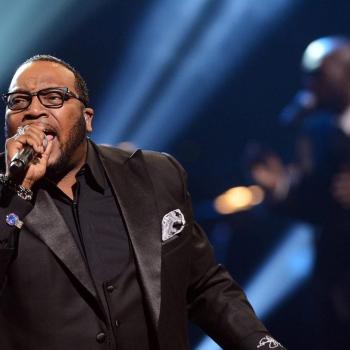Editors' Note: This article is part of the Patheos Public Square on the Future of Faith in America: Progressive Christianity. Read other perspectives here.
Let me start with the punchline: I believe that the best days for Christianity are ahead of us, not behind us.
A few months ago, I was speaking at a conference when a man in his twenties stood up and asked, "What makes you suggest that the Church has a future? I can't figure out what difference my church is making in my life or in anyone else's." With a huff, he sat back down; the room sat in a stunned silence.
"If that is really true, then your church should close its doors," I replied. "But I see hundreds of examples of faith communities across our nation where that is not the case. Here is the difference: They are measuring their impact by different metrics than most other congregations today."
City of Refuge in Oakland, California founded by Bishop Yvette Flunder, is a good example. They have a small, unassuming building with a newly renovated sanctuary. The rest of the building has been transformed into a community center, hosting dozens of local union offices and non-profit ministries that serve the wider community. They care about the number of people that gather on a Sunday morning, but they define their congregation as the people living within the community.
Or look at The Welcome Church founded by Rev. Violet Little. She is an ELCA pastor who started a church on the streets for homeless women and men in Philadelphia. They meet in the parks throughout the city where Violet carries in a table that serves as the altar. They gather around for a short worship service followed by a shared meal. Some months ago, she began to teach the homeless men and women to knit as an experiment in social enterprise. Today, you can buy their knitted scarves, hats, and gloves online. They are making a meaningful difference in the lives of these homeless people and the communities in which they live.
In both of these examples, these faith communities are measuring their "Sunday attendance." But they are equally concerned about the crime rates in their communities. Just as they measure the weekly offering, they are also measuring the unemployment rate in their communities. Their "scorecard" is not simply inwardly focused, as is the case in too many of our churches. These congregations care about the difference they are making in the world.
This simple shift in focus seems to be one of the key factors in the vitality of churches today and into the future. Here are a few more:
1. Trendlines, not headlines, are reshaping the church. Headlines are designed to get our attention. Trendlines tell us what is happening over time. Headlines tell us that no one is going to church, and Christianity will soon be dead. Trendlines tell us that simply isn't the case. The way we express our faith as individuals and communities is changing…for the better. Crowdsourcing, "going local," and Do-It-Yourself movements, cloud thinking, sharing economies…these and many more are inviting us to explore new ways of being Christian and shaping congregational life. What does a crowd-sourced sermon look like? What can the church learn from the sharing economy where instead of owning something we simply share it as a community (think ZipCar)?
2. Fifty percent of the clergy in many denominations are expected to retire in the next five years. Did you catch that? Then consider that hundreds of our buildings are about to be closed and/or sold because the congregations can't sustain them anymore. We will preside over a tidal wave of change within denominational structures within the next few years. This means, of course, that we have an enormous opportunity for reinvention and repurposing of critical resources to ensure that our best days are ahead. I would invest in three key areas: New ministry development, repurposing of buildings into self-sustaining community centers, and retooling of leaders (ordained and lay) for leadership in this age.
3. Studies show that Millennials are a generous and ambitious generation looking for platforms to effect local, national, and global change. They don't hate Christianity; they just don't see most churches as a partner in the change they wish to create in the world. Christianity is irrelevant to their dreams of global peace, equality, and social enterprise. We must shift this perception. Our first priority should be creating space and platforms for twenty-somethings to create and innovate on a large scale. The church is one of the few global infrastructures that can be leveraged for mobilizing people on a massive scale for the work of justice in the world.
What if we are more than survivors of Christianity's decline? What if we are the pioneers of a new age of Christianity? What if the best of progressive Christianity is yet to come? Henry Ford once said, "Whether you think you can or you think you can't, you are right." When it comes to the healing of our planet, I think we can. When it comes to the fight for justice and equality, I think we can. There may come a day when our churches die, our denominations collapse, and our faith feels irrelevant. But this is not that day. I believe our best days are ahead.
7/29/2015 4:00:00 AM




